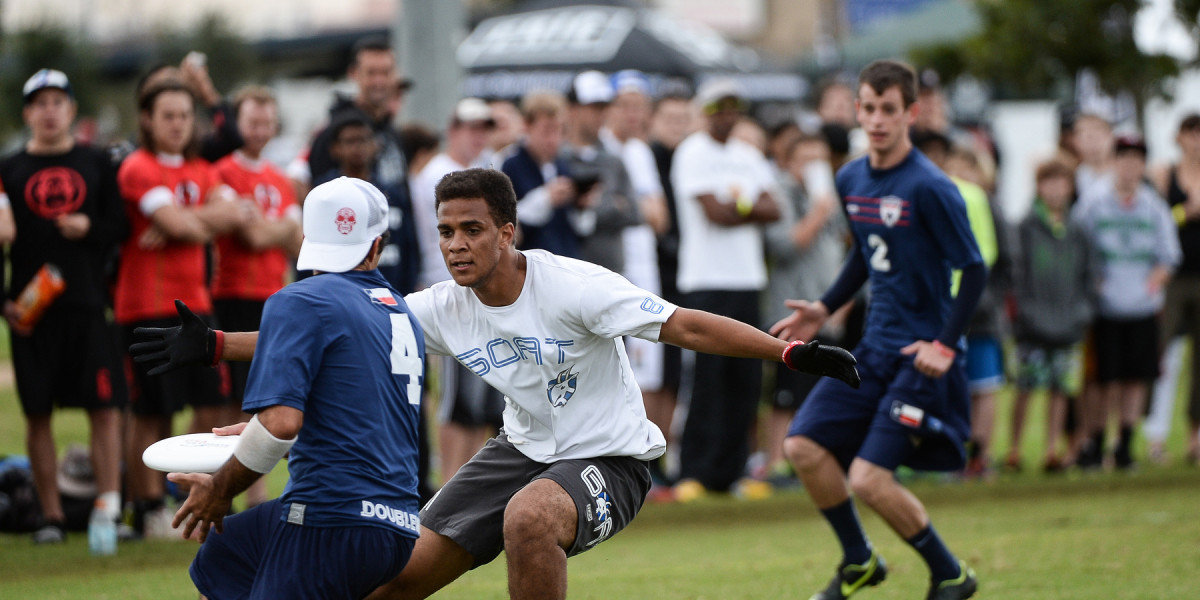 Kevin Leclaire - UltiPhotos.com
Kevin Leclaire - UltiPhotos.com
Editor’s note: Lou is taking a one-month sabbatical to focus on College Nationals. Win the Fields will return June 4. In the meantime, we’re running How to Cheat to Win (Without Cheating), a series originally posted here.
Hey defenders? Ever have that frustrating experience of completely sewing a team up, only to get to stalling 8 and having the thrower call a foul because you brushed their shoulder? Then, when the disc comes back in (at stalling 5), the thrower has had a chance to breathe and reassess the situation and they get off the easy dump? You’ve just been jobbed by the ticky-tack foul call.
Throwers, here’s how you make it happen:
1. Don’t call a foul before 6. Ever. If you do, you are doing the defense a huge favor. You are stopping play during the most fruitful period of the stall count when you are most likely to throw a pass for advantage, as opposed to a pass to reset.
2. When you know you are in trouble, pivot. There has been a lot of blog-blather about useless pivoting and it is all true, but this is useful pivoting (even though you aren’t going to throw it. Make sure you step forward on your pivot and bring the disc across your stomach as you do so. Both these things will help insure contact, which you need to call the foul. (Bonus: drop the disc when it hits the marker’s stomach. Call strip. Watch marker apologetically pick up the disc.) If you get any contact, call the foul.
3. Don’t forget the “fast-count” call. If by some miracle (see below) the marker manages to avoid the contact, you can always call a fast count. Everyone breaks this rule (put a clock on it, if you’re curious) with most stall counts running about 7 seconds. Typically, people don’t call fast count until the count gets down into the 5 second range. This will buy you at least a couple of seconds and if the defender botches the go-back-two rule, call it again and get a full reset to zero. A warning though: this is a weak-ass move and will make you no friends.
How do you stop it?
1. Don’t foul. It is the rule after all. It is a huge disadvantage if you mark to ensure that you will never commit a marking foul, though. The only way to do that is to never pressure the thrower, which is an obvious recipe for disaster. A good distinction is between trying to make a play and trying to make a foul. If you get someone on the arm after going for the block, oh well, it happens. If you get someone on the arm because you’re beat and you hold them…well, you’re a cheater and you deserve all the ticky-tack foul calls against you.
2. Definitely don’t foul after 6 in the stall count. Really, you don’t even want to touch the thrower after stalling 6. Smart markers play tight early and loose late. There is some really nice footage of this technique from the Worlds Final. Here is the entire game piece-by-piece, but look at this aerial footage first. Notice Sockeye’s (white) hand-checking on the mark early in the count and their dropping off after a count or two. (Interestingly, Revolver plays fairly soft on the mark, instead relying on their down-field footspeed.)
3. Be ready for the jump-back. Most ticky-tack foul calls come from the pivot from forehand to backhand. It is much easier to draw a foul on the backhand side because you can lead with your shoulder and elbow; on the flick-side, you have to hold your shoulder back making it harder to create contact. As you lean in to pressure the flick, be prepared to leap back like crazy when the thrower pivots to the backhand side. I’ve actually seen throwers fall over when they didn’t get the expected contact.
4. Understand that it’s all the game. More than any other aspect of ultimate, marking and throwing has challenged the gray area in the rules. Markers press, throwers react, markers react back and on and on and on…I can’t tell you how many times I’ve screamed in frustration at a stalling 7 foul call; not frustration at the thrower, but frustration with myself for giving the thrower the opportunity to call the foul. If you are going to mark aggressively (and you should, it makes for good, physical, athletic ultimate) you have to live with the foul calls.
Addendum: My editor tells me that the tone and moral of these posts are contradictory. Am I for these moves or against them? Hm. I tried to lay out my opinion and approach in the introduction to this series and it partially addresses this issue.









Comments Policy: At Skyd, we value all legitimate contributions to the discussion of ultimate. However, please ensure your input is respectful. Hateful, slanderous, or disrespectful comments will be deleted. For grammatical, factual, and typographic errors, instead of leaving a comment, please e-mail our editors directly at editors [at] skydmagazine.com.